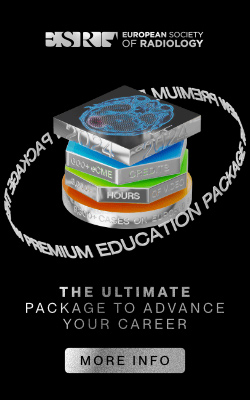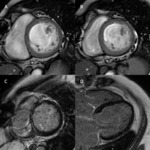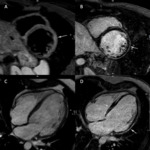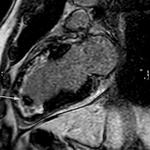Learning objectives
The purpose of this poster is to illustrate causes,
findings and differential diagnosis in dilated cardiomyopathy (DCM) using the cardiac magnetic resonance (CMR).
Background
DCM is the final common pathway of a number of cardiomyopathies; it is typically characterized by the enlargement and dilation either of the left ventricle (LV)or of both heart ventricles and by the impaired contractility of ventricles defined as left ventricular ejection fraction (LVEF) less than 40%.[1]
DCM can be classified either as primary DCM,
when the pathological involvement is predominantly limited to the myocardium or as secondary DCM,
when the ventricular dilation is the final stage of an extensive myocardial damage which can be...
Findings and procedure details
Current clinical indications to CMR in DCM can be summarized as follows:
Accurate assessment of ventricular volumes,
wall thickness and contraction function as well as tissue characterization (pretreatment and follow-up)
Detection of intracavitary thrombi
Differential diagnosis between ischemic and non-ischemic DCM
Differential diagnosis in non-ischemic DCM
Preimplantation of cardiac resynchronization therapy (CRT)
Prognostic information (LGE,
T1 mapping,
ECV,
etc.).
Although the acquisition technique should be tailored to a specific clinical request,
a standard imaging protocol in DCM has to include Cine-SSFP,
T2w-STIR,
T1 mapping,
T2...
Conclusion
In relation to patients with DCM,
CMR should be used for an accurate assessment of the ventricular values,
etiological diagnosis and for the prognostic value.Identification of prognostic factors is necessary to enable physicians to accurately stratify risk in patients with dilated CMP and tailor management accordingly.
References
Paldino A,
De Angelis G,
Merlo M,
Gigli M,
Dal Ferro M,
Severini GM,
Mestroni L,
Sinagra G.
Genetics of Dilated Cardiomyopathy: Clinical Implications.
Curr Cardiol Rep.
2018 Aug 13;20(10):83.
Price JF,
Jeewa A,
Denfield SW.
Clinical Characteristics and Treatment of Cardiomyopathies in Children.
Curr Cardiol Rev.
2016;12(2):85-98.
Mestroni L,
Brun F,
Spezzacatene A,
Sinagra G,
Taylor MR.
Genetic causes of dilatated cardiomyopathy.
Prog Pediatr Cardiol.
2014;37(1-2):13-18.
Maron B.J.,
Towbin J.A.,
Thiene G.,
Antzelevitch C.,
Corrado D.,
Amett D.
Contemporary definitions and classification of the...




